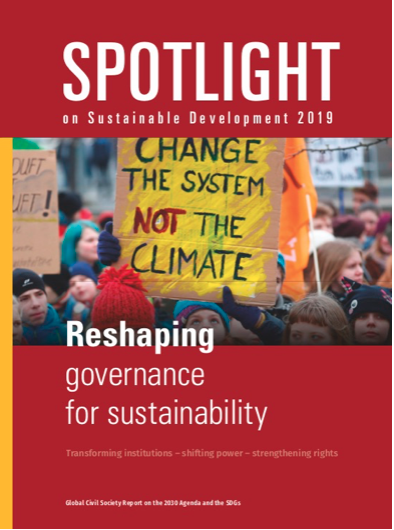Download Spotlight on Sustainable Development 2019 here.
July 8, 2019
“The implementation of the 2030 Agenda is not just a matter of better policies. It requires more holistic and more sweeping shifts in how and where power is vested, including through institutional, legal and political commitments to realizing human rights.”
This is the main message of the Spotlight Report on Sustainable Development 2019, the most comprehensive independent assessment of the implementation of the 2030 Agenda, co-published by eight international NGOs, networks and trade unions, including the Center for Economic and Social Rights (CESR).
The theme of the 2019 Spotlight Report is “Reshaping governance for sustainability: Transforming institutions – shifting power – strengthening rights.” It presents a range of analyses of how current global and national governance arrangements are hindering implementation of the Sustainable Development Goals, and it puts forward recommendations for the structural reforms needed. In doing so, it draws from a variety of reports from the national level, summarized in the first section of the report. It also builds on the 2018 report which explored the alternative policies necessary for truly rights-aligned sustainable development, and the 2017 report which interrogated the role of the private sector and private financing.
“The hard wiring of human rights in the SDGs is a potentially powerful corrective to the serious governance deficits which have emerged around the 2030 Agenda since 2015,” argues CESR’s Executive Director Ignacio Saiz in a special contribution to the report on the role of human rights in governance of the SDGs.
In the chapter on Goal 10, CESR’s Kate Donald and Mahinour El-Badrawi, along with Grazielle David of Red de Justicia Fiscal de América Latina y El Caribe, critically reflect on the International Monetary Fund’s outsized role in economic governance, and how it affects prospects for achieving SDG commitments on inequalities, looking in particular at the impacts of its policies in Egypt and Brazil.
Reforms supported or demanded by the IMF in these contexts have further entrenched inequalities and wreaked devastation on the rights of many groups, raising serious questions according to the authors. Should the IMF’s advice and strictures have more weight than human rights obligations? Should the current system of global economic governance, which is dominated by the richest countries and has led to the inequality crisis, be trusted to play a constructive role in the transformation needed?
The Spotlight Report provides an important complement and counterpoint to the official discussions at UN headquarters. The 2019 HLPF—with with the overall theme "Empowering people and ensuring inclusiveness and equality"—marks the first time that SDG 10, which commits to reducing inequality within and among countries, is up for special scrutiny. This marks a particular milestone for CESR, as the inequality-related aspects of the SDGs have been a major focus of the Center's work.
Despite its many deficiencies, which CESR has documented in previous years, the HLPF continues to be the only real chance to scrutinize SDG implementation at the global level. It offers an important space to take the pulse of implementation so far, interrogate the official narratives, and propose alternative solutions. Therefore, CESR is dedicating its efforts at this year’s HLPF to seeking a revitalized recognition that fulfilment of the SDGs—and the human rights obligations underpinning them—demand urgent and concrete action to remedy inequalities, without which progress across all the Goals will blocked. As critical tools in this endeavor, CESR will highlight the need for rights-based, redistributive fiscal policies, major reform of global economic governance to remedy the extreme imbalance of power between countries, and the primacy of human rights norms and principles as a roadmap and litmus test for assessing progress.
The Spotlight Report is published by the Arab NGO Network for Development (ANND), the Center for Economic and Social Rights (CESR), Development Alternatives with Women for a New Era (DAWN), Global Policy Forum (GPF), Public Services International (PSI), Social Watch, Society for International Development (SID), and Third World Network (TWN), supported by the Friedrich Ebert Foundation.
